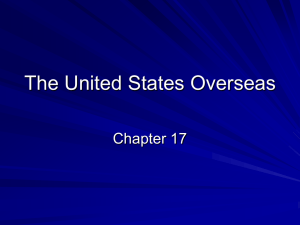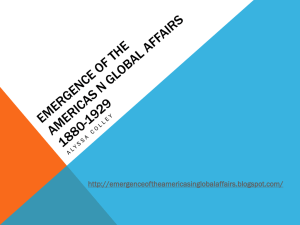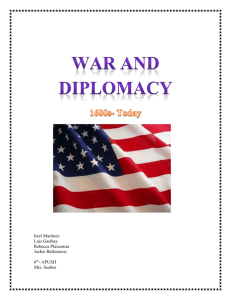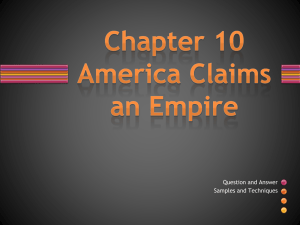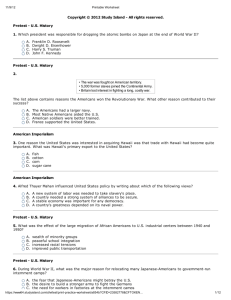A New Power on the World Stage
advertisement
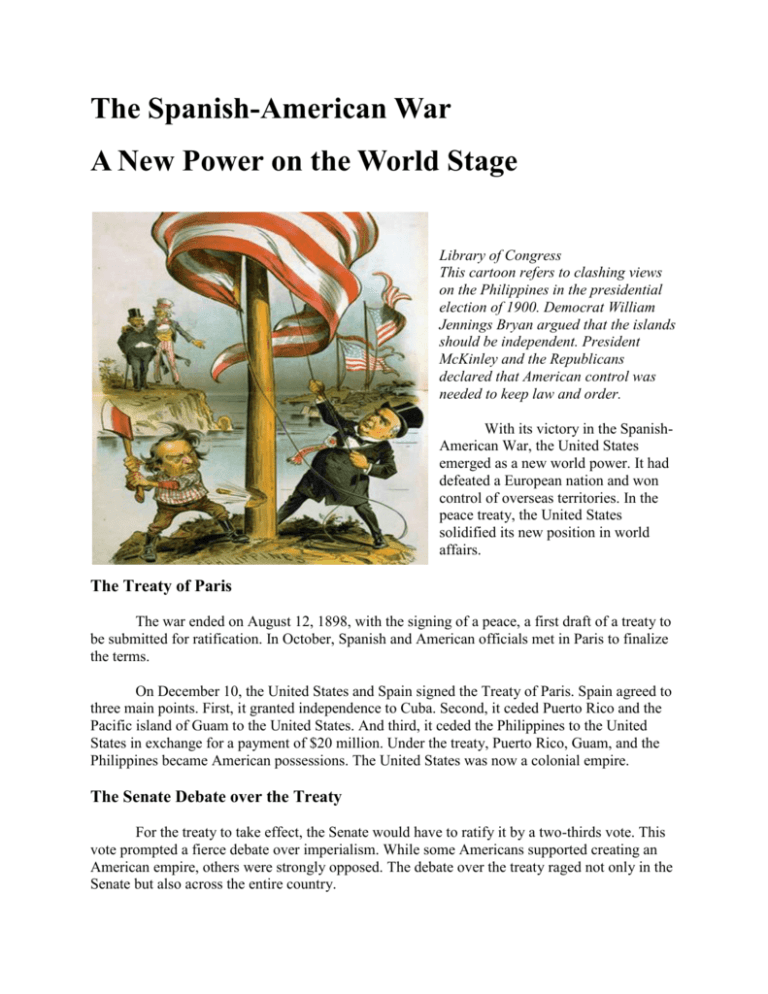
The Spanish-American War A New Power on the World Stage Library of Congress This cartoon refers to clashing views on the Philippines in the presidential election of 1900. Democrat William Jennings Bryan argued that the islands should be independent. President McKinley and the Republicans declared that American control was needed to keep law and order. With its victory in the SpanishAmerican War, the United States emerged as a new world power. It had defeated a European nation and won control of overseas territories. In the peace treaty, the United States solidified its new position in world affairs. The Treaty of Paris The war ended on August 12, 1898, with the signing of a peace, a first draft of a treaty to be submitted for ratification. In October, Spanish and American officials met in Paris to finalize the terms. On December 10, the United States and Spain signed the Treaty of Paris. Spain agreed to three main points. First, it granted independence to Cuba. Second, it ceded Puerto Rico and the Pacific island of Guam to the United States. And third, it ceded the Philippines to the United States in exchange for a payment of $20 million. Under the treaty, Puerto Rico, Guam, and the Philippines became American possessions. The United States was now a colonial empire. The Senate Debate over the Treaty For the treaty to take effect, the Senate would have to ratify it by a two-thirds vote. This vote prompted a fierce debate over imperialism. While some Americans supported creating an American empire, others were strongly opposed. The debate over the treaty raged not only in the Senate but also across the entire country. Leading opponents were the members of the Anti-Imperialist League, an organization formed during the war to oppose the establishment of U.S. colonies. Its membership was diverse, ranging from union leader Samuel Gompers to millionaire industrialist Andrew Carnegie. Social worker Jane Addams joined, as did author Mark Twain. Although the motives and political views of league members varied widely, they all believed that imperialism violated the country's founding principles of freedom and democracy. As the league's platform stated, "We hold that the policy known as imperialism is hostile to liberty . . . We insist that the subjugation of any people is 'criminal aggression' and open disloyalty to the distinctive principles of our Government." Supporters of the treaty included many prominent political leaders, such as President William McKinley, Theodore Roosevelt, and Senator Henry Cabot Lodge. During the Senate debate, Lodge argued that forming an empire was critical to the nation's future. He declared that the United States needed to compete equally with other great nations. In a letter to Theodore Roosevelt, Lodge wrote that rejection of the treaty would be a "humiliation of the whole country in the eyes of the world" and would "show we are unfit to enter into great questions of foreign policy." The Senate debate raged for a month. In the end, the supporters of empire won out. By a vote of 57 to 27, a two-thirds majority by the narrow margin of two votes, the Senate ratified the Treaty of Paris on February 6, 1899. The United States now had its empire. But the debate over imperialism would continue into the 20th century. The United States Stays in Cuba Corbis After the war, Cuba was under U.S. military rule until 1902. Later, U.S. troops reoccupied Cuba several times. Here soldiers assemble in Havana in 1908. The American flag flies above the former Spanish governor’s palace. Cuba also remained an issue in American foreign policy. Although the Treaty of Paris granted Cuba independence, the island was in ruins. President McKinley decided that the United States should remain in Cuba to restore order and assist in the island's recovery. For four years, the United States ruled Cuba under a military government. This government improved sanitation and built schools and roads. But many Cubans resented American control. They believed that the occupation violated the spirit of the Treaty of Paris and the Teller Amendment, which had pledged that the United States would leave the island after the war was over. The United States finally withdrew its troops in 1902, but only after Cuba added provisions to its constitution to protect American interests. These provisions, called the Platt Amendment, allowed the United States to intervene in Cuban affairs and to buy or lease land for naval bases. In the years to come, U.S. troops reoccupied Cuba on several occasions. The United States finally agreed in 1934 to repeal the Platt Amendment. However, a U.S. naval base at Guantánamo Bay, on Cuba's southeastern coast, still operates under a permanent lease. American companies also gained significant control over the Cuban economy. By 1913, American investment on the island had quadrupled from prewar levels to $220 million. U.S. business interests owned 60 percent of Cuba's rural lands and controlled many of the island's industries
